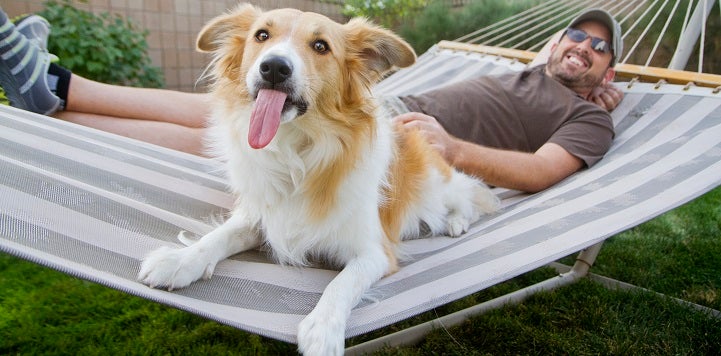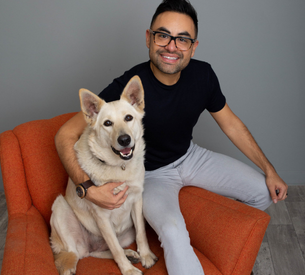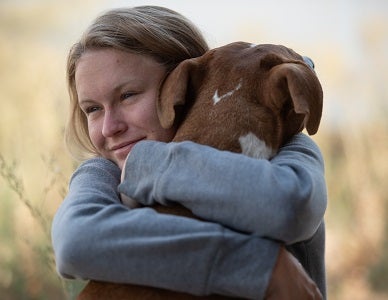
From surviving to thriving: an interview with José Ocaño
Last week we addressed the topic of mental health in animal welfare, which is always timely but seems even more so these days. Even before COVID turned our world upside-down, many who work or volunteer in this field struggled with the daily pressures that accompany trying to be a voice for the voiceless. Stress is a constant, needs outweigh resources, we witness sometimes greatly disturbing situations and we often don’t get paid a whole lot to deal with any of it.
These challenges don’t discriminate, either: they affect people at every stage of their career, at all levels of an organization. Look around and you’re bound to spot someone who can commiserate when you’re having tough days. I count myself lucky to work with many people who are excellent sounding boards when I’m grappling with emotionally charged situations.
One of the best listeners (and talkers) is my colleague and friend José Ocaño, senior director of people and culture. He always has some words of wisdom to share and was more than happy to share some of them from a recent conversation we had on this topic.
You bring a unique perspective to the topic of mental health due to your history in animal welfare starting at the age of 18. Not only did you enter an emotionally taxing field, but you also brought a lot of baggage with you from your upbringing. Can you share a bit about that and talk about how it affected your career?
 I grew up feeling helpless and inadequate, with a deep sense of having no voice or power. Those feelings can turn to poison over time, but instead I compartmentalized to survive whatever challenge I was facing. I used those coping skills on day one of my job at Pima Animal Care Center (PACC) in Tucson, Arizona. I loved animals and I thought the shelter was the place where I could help them the most. Instead, I was asked to take life away.
I grew up feeling helpless and inadequate, with a deep sense of having no voice or power. Those feelings can turn to poison over time, but instead I compartmentalized to survive whatever challenge I was facing. I used those coping skills on day one of my job at Pima Animal Care Center (PACC) in Tucson, Arizona. I loved animals and I thought the shelter was the place where I could help them the most. Instead, I was asked to take life away.
I often get asked, why did you stay? I felt the conviction to stay because I knew that change would only happen if more staff advocated for it, and I wanted to be part of that. Plus, the skills I developed to survive the trauma I experienced as a kid allowed me to thrive in a chaotic and emotionally charged environment. But for many years, I was working from a place of pain, scarcity and unhealed wounds.
We touched on that a bit in the Program Spotlight – the practice of walling things off, pushing them down so that we can get through the moment – and how unhealthy that is.
Shutting down to move forward worked for me for a long time, but it did damage along the way. The body keeps score and eventually you will pay somehow. I had to recognize that I was sustaining myself with other unhealthy coping mechanisms like eating and drinking too much. I also relied on external factors to keep myself going and before I knew it, I found my self-esteem was tied to getting promoted, getting recognized and getting raises.
For me, I am no longer interested in “surviving;” I want to thrive. That means leaning into mental models that give me a stronger framework for how to perceive my realities; developing healthy coping skills that ground me when life gets tough; and most importantly, changing the internal narrative in my head about what I think people expect of me and what I expect from myself.
Don’t get me wrong, I still have bad days, weeks and months, but I have the self-awareness and tools now to get unstuck. I no longer am operating from a numb, ego-centric place, and that has transformed my life.
I used to have recurring nightmares where I suddenly remembered I had another house someplace that was filled with cats and dogs. And I hadn’t been there in weeks to feed them and give them water. I rushed over there not knowing if I would find them all dead or clinging to life and of course I was never able to save all of them.
I totally relate to having nightmares about the work. I have some awful moments that I only relive in my dreams. I used to keep a folder with all the intake pictures of the dogs and cats I couldn’t save. I did this to remind and motivate me of the work that still needed to be done. I finally got to a point where I knew I needed to change how I was approaching the work. I could feel myself slipping into negativity and becoming hardened and that’s not what I wanted for myself.
What is that point? Because you seem to be in a good place today despite having a demanding job. How did you evolve from that 18-year-old who internalized everything and tucked it all away in little boxes?
 I think everyone has their own moment where they realize there’s a need or opportunity to change something. For me, I was about two years into the job at PACC, and I had a friend comment about how I had become more negative, irritable and cynical. I was shocked! I had never been described like that. That was my opening to dig deep and get curious about why I was showing up that way.
I think everyone has their own moment where they realize there’s a need or opportunity to change something. For me, I was about two years into the job at PACC, and I had a friend comment about how I had become more negative, irritable and cynical. I was shocked! I had never been described like that. That was my opening to dig deep and get curious about why I was showing up that way.
I really believe that we should always start from a place of curiosity: the quest for information, free of judgment. I like to ask myself questions like: What’s the story I’m telling myself about the situation? What do I need to believe in order to feel better? What is within my span of control? Is what I’m expecting from myself and others reasonable? Where is this coming from?
That last one is my favorite question because it helps me identify core issues/triggers to work on. This is the journey of personal improvement I will be on for the rest of my conscious life.
I eventually did recognize that my nightmare was about feeling the need to never abandon any animal or leave them feeling unloved, and I knew that wasn’t a reasonable thing to ask of myself. I ended up getting out of hands-on work rescuing and adopting cats to people and moved into my job at Best Friends, which was helping others via a national hotline.
We all need to be more curious about who we are, why we think the way we do and how that drives our behavior and our self-talk. Then we need to ask if that’s really who we are or who we want to be, and whether it’s something we have the opportunity to change.
I have changed a million things in my life, both little and big, and the beginning of all those changes was my mindset. I love my job and it matters to me, but there are things I love and want to have energy for outside of my job, too.
The first thing I did was recognize my unhealthy habits and work on them by eating better, exercising regularly and prioritizing rest. I also knew that my identity at work can’t be the chief marker for how I’m doing in life, because I am not my job.
It’s so dangerous to equate your self-worth and value to your job. When we put our value in the hands of an ecosystem we can’t control, that’s putting our self-worth up for grabs. That’s a scary place to be. The key is finding a role and organization that allows you to have the balance you need. Research also shows that when you have a stronger work/life balance, you tend to have the ability to maintain a healthier wellbeing and that makes you more motivated, productive and connected to the work. Everyone wins!
A wise former colleague once said she realized she could drive herself to the brink and only be able to help animals for a handful of years before she wouldn’t be able to do it anymore. Or she could take care of herself and be around to do good work for decades. She is still around, doing great work but also having a life of her own.
We need to set boundaries in terms of what is being asked of us and what we are willing to do. Work/life balance is a real thing and it’s reasonable to ask for what you need to keep yourself healthy.
That’s part of checking ourselves and reviewing whether what we expect is reasonable – from ourselves, our employees and the public. We also need to recognize that Millennials and members of Generation Z don’t want to lay it all on the ground and not have anything left for friends or family. We aren’t interested in our whole identities being our jobs and we prioritize working in environments where we are paid fairly, have opportunities to develop and have the flexibility that only work/life balance can support. The workforce is shifting, and for organizations to keep top talent, they will have to evolve.
Speaking of that, how do you think Best Friends is doing in recognizing the landscape of our work has changed in these ways and that mental health is really at a crisis point?
 CEO Julie Castle and the senior leadership team really care about preserving the mental health of the staff. There’s a drumbeat that comes from the top about how people are doing physically and mentally, and it’s measured with regular staff surveys. Those results are used to track progress and identify what benefits need to be added that will let people know how important it is for us to be mentally healthy.
CEO Julie Castle and the senior leadership team really care about preserving the mental health of the staff. There’s a drumbeat that comes from the top about how people are doing physically and mentally, and it’s measured with regular staff surveys. Those results are used to track progress and identify what benefits need to be added that will let people know how important it is for us to be mentally healthy.
Our benefits have been expanded and we now have access to an online mental health care option through Tava Health that allows us to access therapists 24-7. Everyone is encouraged to take their holidays and use their paid time off, and to take part in on-site or online yoga and meditation sessions. Every division is taking steps to evaluate how much time is spent in meetings, whether those meetings are actually necessary, and to shorten them as much as possible plus require agendas so they are efficient.
That being said, benefits are only as good as true access to them. I know our animal care staff struggle to break away and take advantage of those meditation sessions or using their PTO, for instance. I think people often think they can’t or don’t have the time to do so – I’m certainly guilty of that.
Same here, especially if I’m on a deadline.
I don’t think we can talk about this without talking about workloads. Are we piling too much on our staff, is that contributing to their inability to take advantage of what is being offered to us? Or are people piling too much on themselves? My boss often says I don’t need to make something a priority because he recognizes I’m already busy. I’m the one who insists on making it a priority and adding it to my already overloaded schedule.
The reality is that no organization can fix that. We can create a culture that makes it easy, but we each need to take the time to use those benefits. At the end of the day, I am responsible for myself, not in a “I don’t need anybody” way, but in a healthy, self-accountable way.
Look, it’s true that our industry is filled with trauma, but it is also filled with people who are compassionate and innovative and emotionally intelligent. We navigate complex situations all the time because we have the ability and skills to do so. We can do the same for ourselves.
It sounds like a tall order – being productive at work while being in alignment with our guiding principles and safeguarding ourselves in ways that won’t do further damage. And it takes discipline and intentionality and follow-through to have better mental health and wellbeing. But we are capable of doing it.
I have been able to visualize and create great changes in my life. Believing in what seemed impossible created this reality.
Everyone reading this should sit down and ask themselves, “What do I need to make myself whole, to work at the highest level in my job without sacrificing myself in the process?” Because there’s no time like the present to plant the seeds of the future you want; no time like the present to do the work to have a stronger relationship with yourself.
We are all part of a movement to Save Them All, but we need to make sure to save ourselves in the process. Only then can we sustainably show up and do this important work.
Check out The Best Friends Podcast episode, Managing our mental health.

Liz Finch
Senior Writer
Best Friends Network
If you enjoyed this program spotlight, you can find our complete catalog of spotlights here.